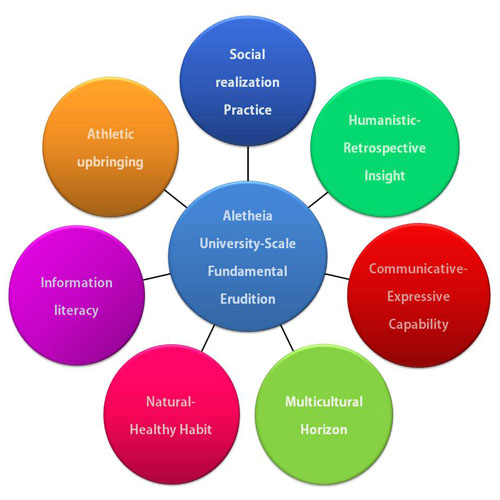Core Competence and Rudimentary Erudition.
Origin
In the year of 1882, Scottish-Canadian missionary, Rev. Dr. George Leslie Mackay founded Oxford College (named after his hometown, Oxford Country in Ontario, Canada) at the estuary of the Tamsui, chiefly to foster local native missionaries for Northern Formosa. The subjects taught then included history, ethics, Chinese etymology, Chinese history (classified into the category of social science) and astronomy, geography, geology, botany, zoology, mineralogy, medical theory, anatomy, clinical practice (sorted into the category of natural science) as well as the biblical principle which made Dr. Mackay the predecessor of Formosan General Education.
In 1994, the antique college was renovated into the modern Tamsui Oxford University College, where general education subsequently assumed the fundamental role of university education. This university realized that professional training alone could not bring up the manpower that a healthy society really needed. In the past two or three decades, professional trainings indeed provided for businesses in Taiwan the technical skills and services that they were badly in want of, thereby elevated the favorable conditions for business development, and in the long run created the economical miracle of this island. However, the side effect of this overemphasis upon professional teachings was that the formation of integrated personality was utterly overlooked, that human concerns were lost, and that moral courage degenerated. As a result, this university called for “the Reformation Conference upon University Education” in August, 1997, which explicitly concluded: our university philosophy is the ultimate guidance for the management of this university; to attain the objective of this university, general education will play an irreplaceable role; how to decently plan out a concrete, plausible curriculum for general education has become an important and serious issue. In order to sketch out the curriculum plan, “the Research Group for General Education Curriculum” was established, and “the Methodology for General Educational Curriculum” was regulated as a result of the overall opinions from the experts in all fields, to deliberately suit the unique temperament of our faculty and students and carry out our educational philosophy.
According to the above ideas and undergoing several adjustments and modifications, this university reexamined the common general education courses required by the university and then democratically worked out the university-scale fundamental erudition needed by all students: social realization practice, humanistic-retrospective insight, communicative-expressive capability, natural-healthy habit, multicultural horizon, information literacy, athletic upbringing. All aspects of cultivation add up to form the core university-scale erudition and hopefully develop the integrated personality indispensable to the refined talents fostered by this phenomenal university.

Aletheia university-scale fundamental erudition
Basic Capabilities 1. Social Practice Capabilities
- 1-1 Students are capable of applying what they have learned to the community and social care
- 1-2 Students are capable of applying what they have learned to daily life.
Basic Capabilities 2. Personal Reflection Capabilities
- 2-1 Students can have the knowledge and the sense of esthetics to appreciate literary works and arts.
- 2-2 Students can have the ability to identify logical reasoning independently.
Basic Capabilities 3. Communication Capabilities
- 3-1 Students can have the ability to communicate clearly and fluently in Chinese.
- 3-2 Students can have the ability to get along and cooperate with others.
- 3-3 Students can have the ability to solve problems around them.
Basic Capabilities 4. Multi-culture Capabilities
- 4-1 Students can have the ability to express themselves in more than one foreign language.
- 4-2 Students can have the ability to communicate in a foreign language and develop their global visions.
- 4-3 Students can respect different views of value and multi-cultures in accordance with their empathy and open mind.
Basic Capabilities 5. Nature and Health Capabilities
- 5-1 Students can realize the importance of environmental protection.
- 5-2 Students can have the knowledge about the importance of life conservation.
- 5-3 Students can have the knowledge about the technologies used in our daily life.
Basic Capabilities 6. Information Capabilities
- 6-1 Students can have the ability to do the clerical work, make a brief presentation, conduct data analysis, and use Internet-related software.
- 6-2 Students are capable of using searching engines on the Internet to get the data they need and process them.
- 6-3 Students have related knowledge of intellectual property rights and thereby avert legal violation.
Basic Capabilities 7. Physical Education Capabilities
- 7-1 Students can form a habit of doing regular exercise through their life.
- 7-2 Students can improve their physical fitness.
- 7-3 Students can have the knowledge of sports recreation and healthy lifestyle.
- 7-4 Students can possess the knowledge of physical education and its application.
- 7-5 Students can have the team spirit and harmonious interpersonal relationships.
- 7-6 Students can have the knowledge of sports skills and be able to appreciate different sports.
Click Num:
Share